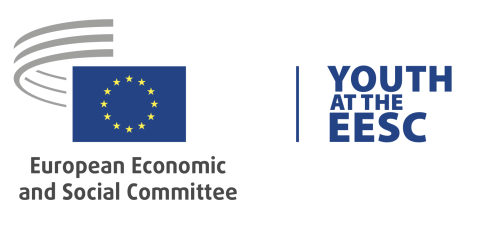European Economic
and Social Committee
‘EU Youth Test’ at the EESC
What is the ‘EU Youth Test’ at the EESC?
In September 2022, the EESC adopted the opinion The EU Youth Test, a tool designed to strengthen youth participation and youth mainstreaming in policy-making based on consultation, impact assessment and mitigation measures, becoming the first EU institution committing to its implementation. At the EESC, this means for example involving youth representatives in opinions. In April 2024, the EESC Bureau approved a methodology drafted by the EESC Youth Group for applying the ‘EU Youth Test’ at the EESC.
How can a youth organisation get involved?
An application form for interested youth organisations to apply to take part in the ‘EU Youth Test’ at the EESC can be found on the left-hand side menu under the tab called 'Apply here to take part!'.
In the application form the youth organisations will be able to indicate which section(s) of the EESC their expertise corresponds to. The sections of the EESC are:
- Economic and Monetary Union, Economic and Social Cohesion – ECO
- Single Market, Production and Consumption – INT
- Transport, Energy, Infrastructure and the Information Society – TEN
- Employment, Social Affairs and Citizenship – SOC
- Agriculture, Rural Development and the Environment – NAT
- External Relations – REX
- Consultative Commission on Industrial Change – CCMI
Browse the NaviGate tool to see all the opinions produced by each section.
What happens if an organisation is selected?
The selected youth organisations will be informed via email once a month of the new upcoming opinions within that section. They will be asked to flag any opinions they would like to work on by responding via email within 5 working days.
Please note that due to administrative constraints, a limited number of opinions will go through the ‘EU Youth Test’ at the EESC per year. If an organisation expressed interest in an opinion but it is not selected to go through the ‘EU Youth Test’ at the EESC, other involvement could be foreseen such as providing input on the topic via email, a meeting with EESC members etc.
What happens when an opinion is selected for the ‘EU Youth Test’ at the EESC?
The organisation will be informed via email if they expressed interest in an opinion which is selected for the ‘EU Youth Test’. If several youth organisations expressed interested in one opinion, they will be put in touch and asked to agree amongst themselves who between them will be the youth representative. This youth representative should have relevant experience on the topic of the opinion and speak on behalf of all interested parties. The selected person must confirm their participation in the opinion-making process to the EESC within 5 working days.
What is the role of a youth representative?
A youth representative is the person selected to represent all interested youth organisations throughout the opinion-making process at the EESC.
This person will be invited to actively participate in all study group meetings for that opinion.
|
During these study group meetings, the youth representative will be invited to take part in the discussions, and discuss the potential impact of the topic of the opinion on young people, and any eventual mitigation measures. They will also be given the chance to provide written contributions.
No monetary allowance is foreseen for the online participation of youth representatives, nor the physical presence if the person is based in Brussels. If the presence of the youth representative is required for a meeting, the travel expenses will be covered if the person travels more than 100km to the EESC's offices (Rue Belliard 101, Brussels).
What language will the youth representative work in?
English and French are the working languages of the EU, but there could be interpretation into any of the other 22 official EU languages, if it is already foreseen by the EESC. If this is the case, this would be communicated to the youth representative ahead of the meeting.
For more information on other youth engagement opportunities at the EESC visit our webpage 'Youth Engagement at the EESC' or contact us at: youtheesc@eesc.europa.eu.
